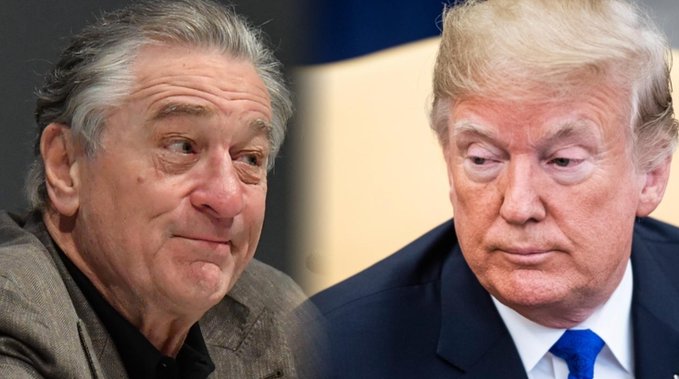We are a star struck nation. Some actors like to use their star status to share their political platforms. Depending on their popularity, charisma, communication skills and successful careers, they sometimes even run for political office.
Other times they just get quoted/ even have editorials... Here's a familiar face...

The Other 98%
Here are Robert De Niro's words about another New Yorker, this one a reality tv star...
“I’ve spent a lot of time studying bad men. I’ve examined their characteristics, their mannerisms, the utter banality of their cruelty. Yet there’s something different about Donald Trump.
When I look at him, I don’t see a bad man. Truly.
I see an evil one.
Over the years, I’ve met gangsters here and there. This guy tries to be one, but he can’t quite pull it off. There’s such a thing as “honor among thieves.”
Yes, even criminals usually have a sense of right and wrong. Whether they do the right thing or not is a different story — but — they have a moral code, however warped.
Donald Trump does not. He’s a wannabe tough guy with no morals or ethics. No sense of right or wrong. No regard for anyone but himself — not the people he was supposed to lead and protect, not the people he does business with, not the people who follow him, blindly and loyally, not even the people who consider themselves his “friends.”
He has contempt for all of them.
We New Yorkers got to know him over the years that he poisoned the atmosphere and littered our city with monuments to his ego. We knew first hand that this was someone who should never be considered for leadership.
We tried to warn the world in 2016.
The repercussions of his turbulent presidency divided America and rattled New York City beyond imagination. Remember how we were jolted by crisis in early 2020, as a virus swept the world. We lived with Donald Trump’s bombastic behavior every day on the national stage, and we suffered as we saw our neighbors piling up in body bags.
The man who was supposed to protect this country put it in peril, because of his recklessness and impulsiveness. It was like an abusive father ruling the family by fear and violent behavior. That was the consequence of New York’s warning getting ignored. Next time, we know it will be worse.
Make no mistake: the twice-impeached, 4-time indicted Donald Trump is still a fool. But we can’t let our fellow Americans write him off like one. Evil thrives in the shadow of dismissive mockery, which is why we must take the danger of Donald Trump very seriously.
So today we issue another warning. From this place where Abraham Lincoln spoke — right here in the beating heart of New York — to the rest of America:
This is our last chance.
Democracy won’t survive the return of a wannabe dictator.
And it won’t overcome evil if we are divided.
So what do we do about it? I know I’m preaching to the choir here. What we’re doing today is valuable, but we have to take today into tomorrow – take it outside these walls.
We have to reach out to the half of our country who have ignored the hazards of Trump and, for whatever reason, support elevating him back into the White House. They’re not stupid, and we must not condemn them for making a stupid choice. Our future doesn’t just depend on us. It depends on them.
Let’s reach out to Trump’s followers with respect.
Let’s not talk about “democracy.” “Democracy” may be our holy grail, but to others it is just a word, a concept, and in their embrace of Trump, they’ve already turned their backs on it.
Let’s talk about right and wrong. Let’s talk about humanity.
Let’s talk about kindness. Security for our world. Safety for our families. Decency.
Let’s welcome them back.
We won’t get them all, but we can get enough to end the nightmare of Trump, and fulfill the mission of this “Stop Trump Summit.””



















